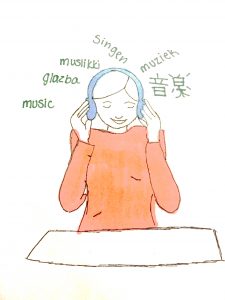
The singer’s skeletal frame whirled across the stage faster as the beat accelerated. I jumped higher, suspended in mid-air at each new word flooding into the arena, into my brain, marking itself forever. Those around me cried back at the performer, words of love and acclaim, and I lost myself in the overwhelming euphoria of the concert. The man on stage sang of love, politics, identity, gender, and loss, and the crowd sang every word back, their beaming faces turning violet, then blue, then orange, with each change of the lights, all in French.
It was a historical night in the music world. Stromae, the Belgian artist described to those not in the know as the Beyoncé of the francophone world, became the first non-English speaking performer to sell out the illustrious Madison Square Garden. To monolinguals, or those who simply do not care, this seems paltry. For those of us who obsess over the international music scene, it was a victory.
I first discovered my penchant for music in other languages in seventh grade, when my music teacher showed me the video for “Comme un Enfant” by the French singer Yelle. While the visuals were arresting, what most struck me was the novelty of this new world of music. Around the same time, “Me Encanta”, by Carla Morrison, a Mexican singer-songwriter, entered my life. I became obsessed. Starting with the French ye-ye girls, I listened to the likes of Francoise Hardy, Sylvie Vartan, and France Gall. I copied their accents, their movements, their clothes. Their style and individuality was inspiring, and I became further enraptured by the language.
I was plunged into the French music of today by accident, from a CD at the Wyckoff library. Camille’s highly controversial 2005 Le Fil was unlike anything else, and I soaked up every discord and exclamation. When it was released, many fans brought it back to record and CD stores, thinking that the underlying hum running through the entire album meant it was broken, but I relished in its strangeness, and the atmosphere of modern French music exploded. Stromae, MC Solaar, and Coeur de Pirate were next, from Belgium, Senegal, and Canada, respectively. Each were so important to me, especially at a time of great personal growth and change.
Listening to music in other languages opens an entirely new world, both artistically and socially. At the Stromae concert, I was surrounded by francophones whom I would never meet outside the arena, and music blogs have lead me to a new online community where people discuss the power of Mala Rodriguez and Ana Tijoux’s lyrics. While I mainly listen to French and Spanish, since those are the languages I am currently studying, I also enjoy artists like Sigur Rós, who is Icelandic, and Fela Kuti, who sang in Nigerian pidgin English and Yoruba. While it is hammered into our brains by every teacher and form of media, we truly are in a global age. Through music, we can learn languages and erase preconceived notions about other areas and peoples of the world, while feeling the beat thump through our bones.
Ana McDade
opinion editor

